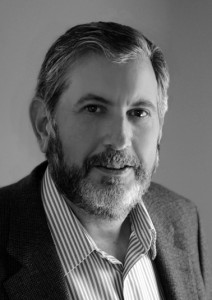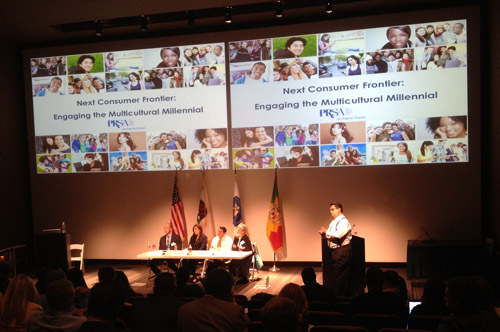America’s millennial generation is a diverse, dynamic group with a wide range of attitudes and interests, and marketers who try to paint the more than 70 million 18- to 32-year-olds with a broad brush do so at their own peril. That was one of the key takeaways at PRSA-LA’s June 25 event, “The Next Consumer Frontier: Engaging the Multicultural Millennial.”
The well-attended evening program, held at the sleek and spacious Deaton Civic Auditorium at the LAPD Headquarters in Downtown L.A., was moderated by KABC-TV and ABC7 “Eyewitness News” reporter Sid Garcia. The panelists were Meredith McCarthy, director of programs, Heal the Bay; Stephen Macias, senior vice president and LGBT Practice Group head, MWW Group; Ellen Chen, president, Asian Professional Exchange (APEX); and Jose Villa, principal of cross-cultural advertising agency Sensis. The program was organized in partnership with the Black Public Relations Society (BPRS) and the Hispanic Public Relations Association (HPRA).
Villa kicked off the evening with a data-rich keynote address that focused on the findings of a recent study conducted by Sensis and market-research firm ThinkNow. The survey, which looked at behaviors and attitudes of Hispanic millennials, indicates that even among young adult Hispanics there is a wide range of thinking on such key issues as family, identity, education, technology and media. Villa noted that there were particularly striking differences between the responses of American-born Hispanic millennials and those of the 44% of Hispanic millennials who are foreign born.
Here are just a few illuminating tidbits from the report, a full copy of which can be obtained at www.hispanicmillennialproject.com.
• Overall, Hispanic millennials are far more optimistic about the future and more likely to believe in the American Dream than their non-Hispanic counterparts.
• Almost half of Hispanic millennials view owning a business as a sign of success while less than a quarter of non-Hispanic millennials do. Fifty-seven percent of foreign-born Hispanic millennials see owning a business as a goal.
• Hispanic millennials consume media in both Spanish and English, with 40% saying they do so equally in both languages.
• Both foreign-born and U.S.-born Hispanic millennials appear to grapple with the issue of maintaining their heritage while fitting into mainstream American culture. Although 56% of foreign-born Hispanic millennials say they have a strong desire to assimilate, 72% say they want to stand out as Latino.
• Among milliennials still living at home, Hispanics are far more likely to chip in for household expenses than their non-Hispanic counterparts.
Although several panelists cautioned against making sweeping generalizations about the youngest generation of American adults, there was general agreement that millennials are typically more accepting than Baby Boomers of people who differ from themselves in terms of race, ethnicity and sexual orientation. Both Macias and McCarthy observed that many millennials are open to donating their time and money to causes they believe in, such as the environment and marriage equality, but are much more likely to do so if they are engaged directly by a campaign that offers clear, specific actions to take.
McCarthy noted that millennials, who have “highly attuned bullshit detectors,” are wary of brands that appear inauthentic in their attempts to associate themselves with causes. They are more likely to engage with brands whose messaging is “humble, genuine, tells a story and lets their voices be heard,” added Chen.
All of the participants agreed on one thing: there is no magic bullet for PR professionals and marketers looking to engage millennials for their brand or cause.
“Throw out your assumptions and do your homework,” said Villa. “The world has been turned upside down.”
L.A. Connect Associate Editor Andrew Hindes is president of The In-House Writer, a copywriting firm that offers writing workshops to public relations agencies and corporate PR departments.










